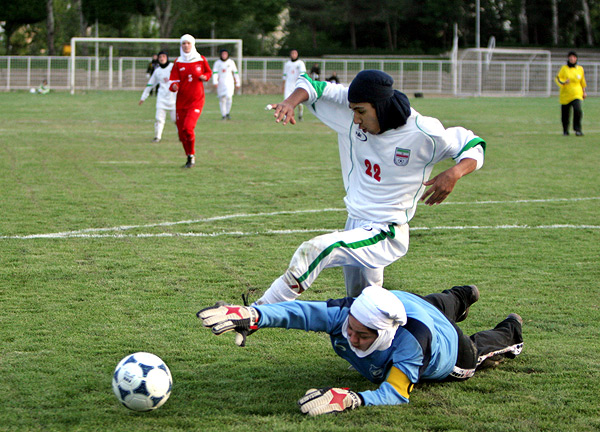By Duncan Mackay
British Sports Internet Writer of the Year
May 2 – A ban on Iran’s women’s team competing in the inaugural Summer Youth Olympic Games in Singapore later this year has been lifted after a new set of clothing that complied with the Islamic dress code was proposed to FIFA, it has been claimed.
Ali Kaffashian, the President of Iran’s Football Federation (IFF), and Omid Jamali, a member of the organisation’s international relations team, travelled to Zurich to hold talks with FIFA President Sepp Blatter after the world governing body banned them from the Youth Olympics in Singapore because they claimed that wearing the hijab was against the laws of the game.
But Kaffashian and Jamali claim that they have convinced Blatter to allow them to compete by proposing a new set of clothing that will still cover the players heads in accordance with Islamic custom but will not break the laws of the game.
FIFA secretary general Jerome Valcke has now written to the IFF announcing that they are happy with the new dress code and that Iran will be allowed to play in the Games in Singapore, which opens on August 14
Abbas Torabian, the director of the International Relations Committee at the IFF, said: “We sent FIFA a sample of our new Islamic dress and fortunately they accepted it.
“They announced that there was no objection if the players covered their hair with hats.”
In its letter, FIFA said that if the hat covers the hair without violating the game’s laws then Iran can use it.
It represents a reversal of FIFA’s original stance which was that under law four only the goalkeeper was allowed to play in headwear.
The decision to ban Iran from the six-nation tournament in Singapore – first revealed on insidethegames – caused controversy around the world and led to FIFA being accused of accused of racism and religious discrimination.
Bahram Afsharzadeh, the secretary general of Iran’s Olympic Committee, claimed the decision was a violation of Muslims rights.
Afsharzadeh said the decision proved FIFA does “not” care about such issues as nationality, religion and race and would create obstacles on their part in the way of the women’s progress.
Rimla Akhtar, the chairperson of the UK Muslim Women’s Sports Foundation, meanwhile, claimed that FIFA had imposed the ban because they wanted to stop the sport developing among Islamic women.
She said: “To me this is quite clearly an issue of religious representation.
“Being the kind of organisation that they are, they do not want Muslim women to be represented on the pitch.”
Contact the writer of this story at zib.l1743668856labto1743668856ofdlr1743668856owedi1743668856sni@y1743668856akcam1743668856.nacn1743668856ud1743668856
Related stories
April 2010: Iran replaced by Thailand over hijab row
April 2010: Iran angry after women’s football team have hijab banned by FIFA

